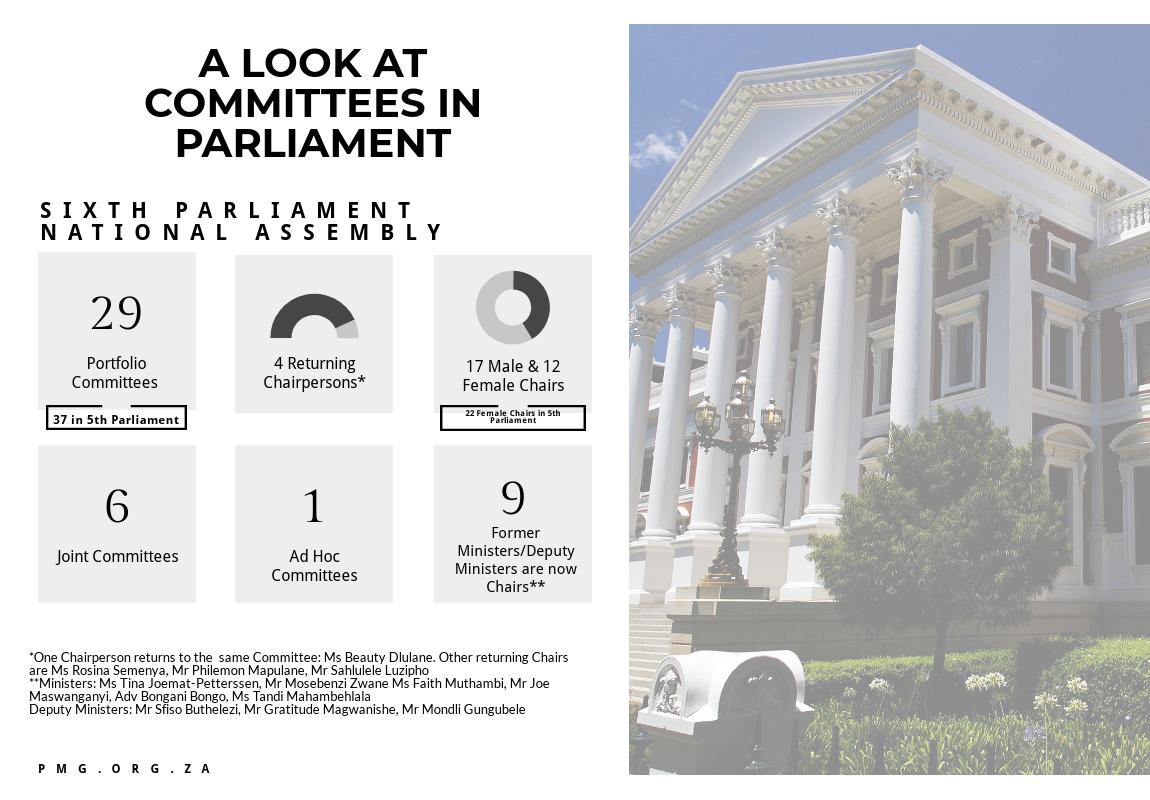A note to the Sixth Parliament: Committee Membership

While most of the public attention is directed at the main chambers, MPs spend most of their times in Committees.
Committees are the site where the real, substantive work (law-making, oversight and budget allocation) happens.
Committees have more time to study, interrogate and debate proposed legislation, policy proposals, budget plans and conduct oversight. They also provide a platform for the public to engage with lawmakers directly.
Given their prominent role, it is important to look into who sits on these structures and how Committee assignments are made. It is more so important considering that the effectiveness of these bodies depend on the quality of its members
Committee membership is distributed among the parties roughly in proportion to the seats they get in Parliament, so if a party wins 20% of the seats, its MPs will occupy about 20% of committee positions.
The NA Rules Committee agreed that all Committees will be comprised of 11 Members: ANC – 6; DA – 2; EFF – 1; other parties – 2.
Where it is practicably possible, each party is entitled to at least one representative in a Committee.
Sometimes the size of a Committee does not allow for all parties to be represented. Smaller parties have a handful of representatives (there are 11 parties with fewer than 15 members in the Sixth Parliament) and it is impractical for them to have a seat on all Committees. Instead, they need to be tactical, prioritise and negotiate their assignments with the other parties in their bloc.
To balance this, Parliament has agreed that:
-all business of Parliament is open to all Members. Members can therefore sit in all Committees and participate. The only difference is when it comes to voting where only Members or their Alternates can exercise this right
- where a matter of national importance is involved, all parties can be involved in order to give credence to a multi-party South Africa.
The current system gives parties control to determine Committee assignments. They can therefore direct what their MPs do in a committee and often party interests overrides everything else. Rank and file Members are not free agents and those who do not follow the party line can be disciplined and expelled.
On the other hand, legislators take an oath of office to uphold the Constitution and should bear the Chief Justice’s words in mind:
“Central to the freedom “to follow the dictates of personal conscience” is the oath of office. Members are required to swear or affirm faithfulness to the Republic and obedience to the Constitution and laws.
Nowhere does the supreme law provide for them to swear allegiance to their political parties, important players though they are in our constitutional scheme. Meaning, in the event of conflict between upholding constitutional values and party loyalty, their irrevocable undertaking to in effect serve the people and do only what is in their best interests must prevail. This is so not only because they were elected through their parties to represent the people, but also to enable the people to govern through them, in terms of the Constitution.
Chief Justice Mogoeng, (United Democratic Movement v Speaker of the National Assembly and Others [2017] ZACC 21)
There is no precise formula that party leaders take into account during the assignment process. It is a complicated, rigorous process involving a balancing act and negotiations. Experience, seniority, expertise, continuity, competence and educational background are some of the major factors taken into account. Added to this mix, you have internal party dynamics, gender, youth and geographical spread.
According to our research, 42% of MPs are newcomers and do not have prior legislature experience. Most of them will not know about the Committee system, budget cycle or how to read an Amendment Bill. It is a steep learning curve and they will need time to develop the specialised knowledge of their Portfolio and build up institutional memory.
Rotating Committee membership can be both good and bad. It can broaden an MP’s experience, bring fresh ideas and counter inertia. On the other hand, too much turnover is undesirable: it is disruptive and weakens the Committee. Many studies draw positive correlations between the number of years on a committee and good leadership, strong support staff and hardworking/competent Members.
Some Committee assignments are more coveted. Not all Committees are equal. Some are significantly busier and have bigger profiles. Parties value certain government Portfolios higher than others and this is reflected in their choices. It is therefore not uncommon to see senior MPs assigned to the most high-profile Committees.
Regardless of the assignment and limitations in the current system, individual MPs can still make an impact and have influence. They can put things in the spotlight and bring forward the concerns of their constituents.
Check Committee Membership here and here
Read our piece on: The critical role of committee chairpersons
About this blog

"That week in Parliament" is a series of blog posts in which the important Parliamentary events of the week are discussed.
We host the latest posts of this blog, written by People's Assembly. You can find more on PA's blog.
About this blog

"That week in Parliament" is a series of blog posts in which the important Parliamentary events of the week are discussed.
We host the latest posts of this blog, written by People's Assembly. You can find more on PA's blog.
